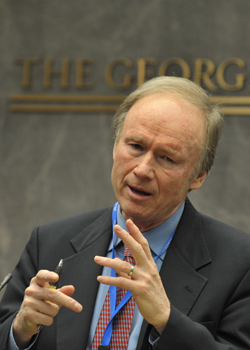 By Sungjoon Cho
By Sungjoon Cho
On the sidelines of the Davos World Economic Forum this week, seventy six WTO member countries agreed to launch a negotiation on electronic commerce. Yes, we all know that e-commerce has recently been skyrocketing, becoming part of our everyday lives. Meanwhile, the WTO has been criticized for having failed to provide effective multilateral rules to regulate e-commerce. I see a bit of déjà vu from the Uruguay Round here, in particular within the context of the North-South tension. Developed countries such as the United States, the European Union and Japan are spearheading this new initiative, while developing countries such as China and India seem to be lukewarm about the initiative. China joined the initiative with the reservation that developing countries’ concerns must be reflected. India argued that the Doha Development Round must be addressed before starting a new set of negotiations in the WTO.
Developed countries such as the EU want to include the following items in the WTO e-commerce negotiation: “improve consumers’ trust in the on-line environment and combat spam”; “tackle barriers that prevent cross-border sales”; “guarantee validity of e-contracts and e-signatures”; “permanently ban customs duties on electronic transmissions”; “address forced data localisation requirements and forced disclosure of source code.” Indeed, the e-commerce chapter of the Comprehensive and Progressive Agreement for Trans-Pacific Partnership (CPTPP) covers those rules. In contrast, some commentators oppose this initiative for the fear of widening global income inequality and monopolization by big Internet players.
To be fair, it is not that the WTO has done nothing regarding this issue. Two decades ago, the WTO members passed a half-page long “Declaration on Global Electronic Commerce” and set up two agendas: launching a comprehensive work program and committing themselves not to impose custom duties on electronic transactions. The WTO sectoral councils have since produced some records of discussion among delegates. For example, at the Council for Trade in Goods meeting, delegates discussed trade in goods-related issues on e-commerce, such as classification, custom duties, and rules of origin. Likewise, they discussed issues such as modes of supply (Mode 1 v. Mode 2), MFN (like service) and transparency at the Council for Trade in Services meeting. They discussed issues such as the use of trademarks on the Internet and domain names at the TRIPS Council. The Committee on Trade and Development discussed potential benefits (such as those to SMEs) and challenges (the lack of human and physical infrastructure) that e-commerce could bring to developing countries.
One might reasonably speculate that the WTO negotiation on e-commerce might gravitate toward the pre-established framework, such as the e-commerce chapter under the CPTPP. Note that most provisions under Chapter 14 of CPTPP appear to be broad and aspirational (“shall endeavor” / “shall cooperate”), rather than specific and definite. Moreover, understandably, there are provisions that leave room for sovereign (regulatory) space (such as Article 14.11:3). Of course, non-CPTPP WTO members might object to some, or all, of those provisions for varying reasons, no matter how vague and hedged they may be. Some countries might not want to “give away this valuable resource for free.”
In closing, we may ponder the question, would this new initiative somehow help the WTO regain its vitality? If so, would such renewed passion for multilateralism encourage WTO members to overcome the current deadlock, such as the Doha Round and the Appellate Body crisis?



Leave a Reply